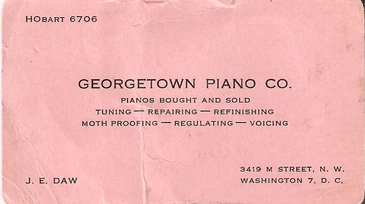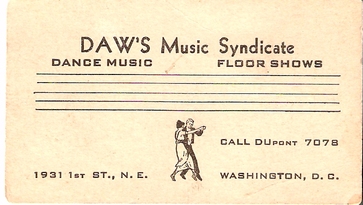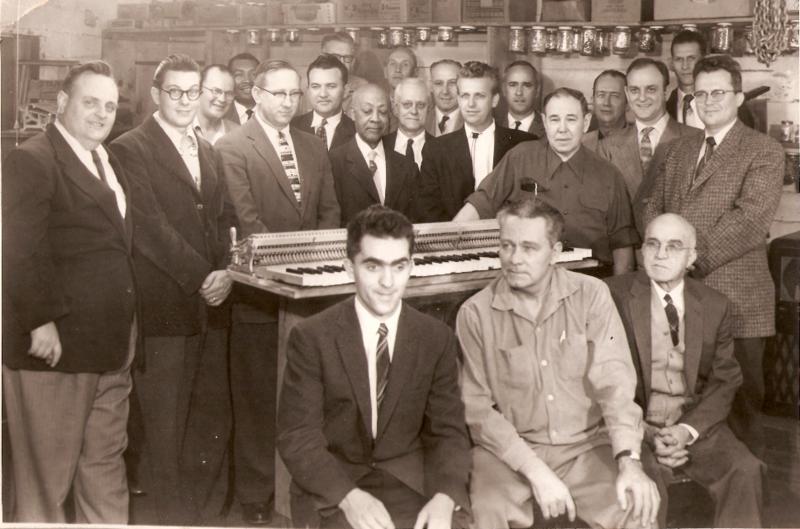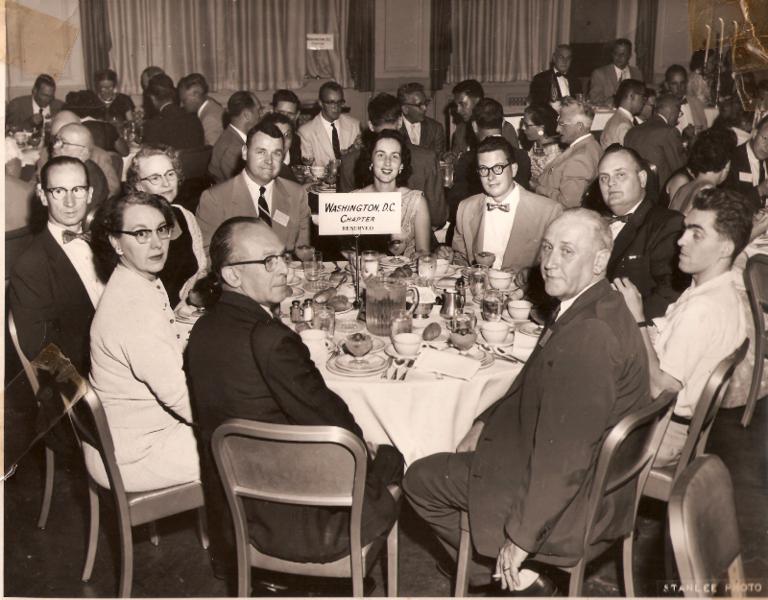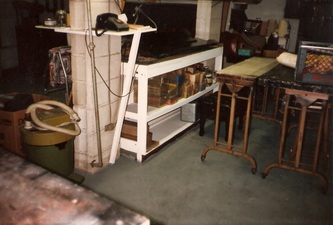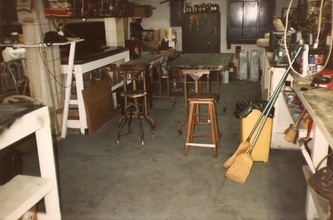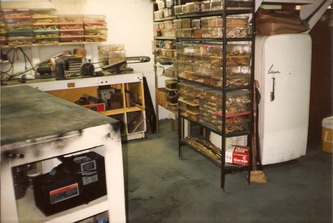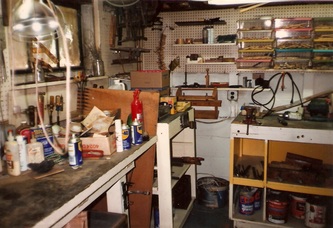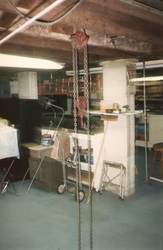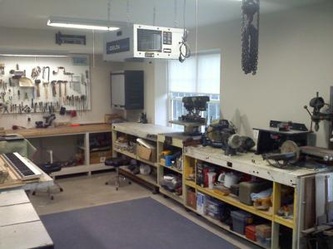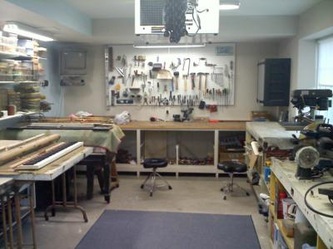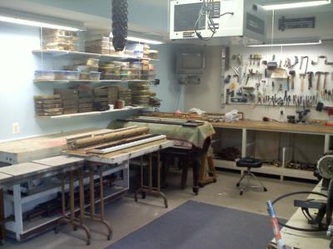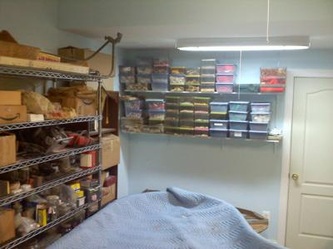Company History
Georgetown Piano Company was founded in 1935 by my grandfather, Jim Daw. He was a Washington, DC-born musician who played multiple instruments, but specialized in playing the trumpet and the accordion. He was also trained on the piano, and later played the organ quite well. As we all know, 1935, of course, was the heart of the Great Depression. As you can imagine, the clubs around the Washington, DC area did not keep up their pianos, and my grandfather became increasingly frustrated at their state of disrepair. So he finally purchased a tuning hammer, and, without any formal training, began to "tune" the pianos, somewhat, to at least make them a little more pleasant to listen to, as well as more acceptable to accompany other instruments. Later, he did attend the Harmony School of Piano Technology in Pennsylvania, earning a degree in piano tuning and repair.
During the late 1930's and early 1940's, he was a member of the United States Navy Band, from which he would later be honorably discharged. Meanwhile, he had formally started, as he called it, his "one-horse business," and christened it Georgetown Piano Company. His initial charge for a tuning: $8.00!! The location of his first store was at 3419 M St., NW (for those of you in the DC area, that`s right across the Key Bridge from Rosslyn, VA into Georgetown), but most interesting was the fact that the phone number was only six digits! I have a business card from that time,
Georgetown Piano Company was founded in 1935 by my grandfather, Jim Daw. He was a Washington, DC-born musician who played multiple instruments, but specialized in playing the trumpet and the accordion. He was also trained on the piano, and later played the organ quite well. As we all know, 1935, of course, was the heart of the Great Depression. As you can imagine, the clubs around the Washington, DC area did not keep up their pianos, and my grandfather became increasingly frustrated at their state of disrepair. So he finally purchased a tuning hammer, and, without any formal training, began to "tune" the pianos, somewhat, to at least make them a little more pleasant to listen to, as well as more acceptable to accompany other instruments. Later, he did attend the Harmony School of Piano Technology in Pennsylvania, earning a degree in piano tuning and repair.
During the late 1930's and early 1940's, he was a member of the United States Navy Band, from which he would later be honorably discharged. Meanwhile, he had formally started, as he called it, his "one-horse business," and christened it Georgetown Piano Company. His initial charge for a tuning: $8.00!! The location of his first store was at 3419 M St., NW (for those of you in the DC area, that`s right across the Key Bridge from Rosslyn, VA into Georgetown), but most interesting was the fact that the phone number was only six digits! I have a business card from that time,
and the number was HO bart - 6706. The "Hobart" was the old way of remembering digits to a number, in this case 4 and 6. His primary business at this time was tuning and repairing, but he also bought and sold new and used pianos. Simultaneously, he was playing music under the title Daw's Music Syndicate, specializing in "dance music" and "floor shows." His number for this enterprise was also 6 digits, DU pont - 7078.
|
Later, sometime in the early 1950's I believe, he moved the store right up the block on M St. to 3403. Here's a picture from the shop there, with many of the local technicians of the area. My grandfather is standing at far left:
|
And here's a picture from the 1957 ASPT (the forerunner to today's Piano Technician's Guild) Convention, with my grandfather (seated right, dark jacket w/bow tie) leading the Washington, DC Chapter:
|
At this time, the phone number became 7 digits, with the key word for the first two becoming FE deral 7 - 5160, which translates to 337-5160 - the same number that's in use today! In the latter part of the 1950's, he became somewhat disillusioned with selling pianos, as well as also continuing to rent his store space rather than owning it. At the same time, Georgetown property values were escalating, and his rent was going to be increasing by a dramatic amount. So, rather than continue to "throw money away," he purchased a house in the Clarendon suburb of Arlington, VA right up the road from Rosslyn. He added an office space onto the rear of the house, and converted the basement into his shop, bringing over several of his large workbenches from the Georgetown store, as well as his considerable inventory of piano parts. He gave up buying and selling pianos altogether, saying, "That's a whole 'nother racket!" He continued using the name Georgetown Piano Company, and also had the phone company "run a crow`s line," as he put it, from DC to VA so he could keep the previously established phone number. I don`t really know if there`s some special line or not (I doubt it!), but it's now what's known as a "foreign exchange," i.e. a "202" area code number that`s operational within the "703" area code. At this time, he also gave up being a musician, in order to fully concentrate on the piano business. He was now working as a piano technician for the DC school system, as well as for his own business. He once told me he would do "3 pianos a day for them, then 3 for myself." Below are a few pics from the basement shop on Daniel Street:
During the 1960's and 1970's business continued to be strong (my earliest recollection of the tuning fee during the early 70's was $35), and around 1972 at the age of 5 I began to go on small jobs and appointments with him, as well as to various factories and supply shops. Of course, like I was really paying attention to what was going on! But later, around the age of 10, I began to do small repairs for him in the shop, as his eyesight was diminishing due to diabetes. My favorite job was replacing plastic spinet elbows with wooden ones, and he would marvel at how well I did the job and the speed with which I would complete it. Later, he had me doing more skilled tasks, such as resurfacing/shaping hammers, replacing keytops and hand filing them, replacing hammers, and eventually restringing and rebuilding. But even as I was doing these things, I didn`t see myself getting into the business. It wasn't until I was in my second year of college at George Mason University in 1986 that I began to give it some thought.
During that fall of 1986, I felt strongly that the time was right to take a break from attending college. Initially, I thought maybe 6 months or a year would suffice. I wanted to make some money, so I thought I would go to work with my grandfather, which would help him out in the process. By this time, his eyesight had grown worse, and there had been a succession of guys who had "worked" with/for him. I say "worked" because frankly, all they were there to do was drive him from one appointment to another. One of them, he said, couldn`t even turn a screwdriver! So by this time, my grandfather was basically reduced to doing tunings and very minor repairs. I figured that together, he and I could start doing more challenging and rewarding (translation: better paying!) jobs. By mid-October of that year, I had reached my decision. I went to his house one night and informed him of my intentions, not quite sure how he would react. He was thrilled, to say the least! So I finished out that semester at GMU, but my heart wasn't really in my schoolwork. I was ready to work, and also to play music. (I'm also a drummer, and by this time had joined my first real band).
Sure enough, within the first few months of 1987, we landed a large rebuilding job, and several moderate repair jobs in the $300-$400 range. Our going rate for a tuning at the time was $55. He was so happy that I had come to work with him, and we thoroughly enjoyed working together. But, he still would not let me tune a piano. He had shown me how to start a tuning on his home piano, but in the customers' homes, he told me to just watch and listen. Slowly, I began to train my ear, and by the end of the year I recall making some smart remarks like, "Are you sure that's in tune?" Well, sometime during 1988, we went into a home for a tuning. Without warning, after I had prepped the piano for him to begin, he turned to me and said, "Okay, now you do it." What?!? Um, okay. Knowing he was right there made me feel a little more secure, in case I thoroughly messed up! But, he never really said anything negative, preferring to let me make mistakes and then correct them. Eventually, I became more confident, and we began to tune pianos together, with one of us starting the tuning, and the other finishing. He said he had never really heard of that being done before.
Unfortunately, his health continued to worsen, and my grandmother had been diagnosed with Alzheimer's disease. So, by 1990, I was doing the majority of the work, while he stayed home and answered calls, booked appointments, took care of bills, etc. I had also become a member of The Master Piano Technicians in 1988, of which my grandfather was already a member. Together we had attended the annual conventions, while I began to accumulate more knowledge in the business of servicing pianos. In July 1994, we had planned to attend the convention in Lancaster, PA., but by this time my grandfather's health had deteriorated severely, so we were unable to go. This was the beginning of the end for my grandfather, and he passed away that August. Needless to say, I was devastated, but I was determined to continue the business.
Today, Georgetown Piano Company is still going strong, and I hope to continue the business for a long time to come. My wife Carla and I have a wonderful home in Elkridge, Maryland, with a new shop that is fully capable of the most basic repairs up to and including complete rebuilding. Here are a few pictures of the new shop:
During that fall of 1986, I felt strongly that the time was right to take a break from attending college. Initially, I thought maybe 6 months or a year would suffice. I wanted to make some money, so I thought I would go to work with my grandfather, which would help him out in the process. By this time, his eyesight had grown worse, and there had been a succession of guys who had "worked" with/for him. I say "worked" because frankly, all they were there to do was drive him from one appointment to another. One of them, he said, couldn`t even turn a screwdriver! So by this time, my grandfather was basically reduced to doing tunings and very minor repairs. I figured that together, he and I could start doing more challenging and rewarding (translation: better paying!) jobs. By mid-October of that year, I had reached my decision. I went to his house one night and informed him of my intentions, not quite sure how he would react. He was thrilled, to say the least! So I finished out that semester at GMU, but my heart wasn't really in my schoolwork. I was ready to work, and also to play music. (I'm also a drummer, and by this time had joined my first real band).
Sure enough, within the first few months of 1987, we landed a large rebuilding job, and several moderate repair jobs in the $300-$400 range. Our going rate for a tuning at the time was $55. He was so happy that I had come to work with him, and we thoroughly enjoyed working together. But, he still would not let me tune a piano. He had shown me how to start a tuning on his home piano, but in the customers' homes, he told me to just watch and listen. Slowly, I began to train my ear, and by the end of the year I recall making some smart remarks like, "Are you sure that's in tune?" Well, sometime during 1988, we went into a home for a tuning. Without warning, after I had prepped the piano for him to begin, he turned to me and said, "Okay, now you do it." What?!? Um, okay. Knowing he was right there made me feel a little more secure, in case I thoroughly messed up! But, he never really said anything negative, preferring to let me make mistakes and then correct them. Eventually, I became more confident, and we began to tune pianos together, with one of us starting the tuning, and the other finishing. He said he had never really heard of that being done before.
Unfortunately, his health continued to worsen, and my grandmother had been diagnosed with Alzheimer's disease. So, by 1990, I was doing the majority of the work, while he stayed home and answered calls, booked appointments, took care of bills, etc. I had also become a member of The Master Piano Technicians in 1988, of which my grandfather was already a member. Together we had attended the annual conventions, while I began to accumulate more knowledge in the business of servicing pianos. In July 1994, we had planned to attend the convention in Lancaster, PA., but by this time my grandfather's health had deteriorated severely, so we were unable to go. This was the beginning of the end for my grandfather, and he passed away that August. Needless to say, I was devastated, but I was determined to continue the business.
Today, Georgetown Piano Company is still going strong, and I hope to continue the business for a long time to come. My wife Carla and I have a wonderful home in Elkridge, Maryland, with a new shop that is fully capable of the most basic repairs up to and including complete rebuilding. Here are a few pictures of the new shop:
Nothing, I repeat, nothing beats working for yourself. Is this the line of work to make millions? Probably not, but as my grandfather said, "We may not be millionaires, but we try to live like 'em!"
Brian A. Hughes
June 2012
Brian A. Hughes
June 2012

